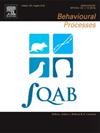Neophobia and exploration behavior in urban gulls: The Kelp Gulls (Larus dominicanus) as a study case
IF 1.3
4区 生物学
Q4 BEHAVIORAL SCIENCES
引用次数: 0
Abstract
Neophobia and exploratory behavior are personality traits through which organisms evaluate and respond to environment changes by adjusting their behavior. The Kelp Gull (Larus dominicanus) is a generalist seabird that consumes a wide variety of prey. Neophobia levels and exploratory behavior in novel circumstances were analyzed in urban adult (n = 13) and immature (n = 15) Kelp Gulls captured in the landfill of Mar del Plata city. These personality traits were not significantly affected by the age of the bird. Longer feeding latencies were observed in presence of novel objects, and neophobia levels were higher in the presence of a transparent box. The exploratory events were brief and influenced by the physical properties of the objects; gulls favored complex and yellow objects. Higher neophobia levels were associated with a longer time to start the exploration and spending less time investigating the objects. Exposure to an urban environment can modulate the novelty response, partially explaining lack of difference in neophobia levels and exploratory behavior between ages, as well as the apparent absence of intrinsic attraction to unfamiliar objects when not associated with a food source. Furthermore, in relation to complex objects, unfamiliar objects likely offer richer information, driving gulls' exploratory preference.
城市海鸥的新事物恐惧症与探索行为:以海带鸥为研究对象。
新事物恐惧症和探索行为是生物体通过调整自己的行为来评估和应对环境变化的人格特征。海带鸥(Larus dominicanus)是一种多面手海鸟,捕食各种各样的猎物。分析了在马德普拉塔市垃圾填埋场捕获的城市成鸟(n=13)和幼鸟(n=15)的新事物恐惧症水平和新环境下的探索行为。这些性格特征不受鸟龄的显著影响。在有新奇物体的情况下,观察到更长的进食潜伏期,在有透明盒子的情况下,新事物恐惧症的水平更高。探索活动很短暂,而且受物体物理性质的影响;海鸥喜欢复杂的黄色物体。新事物恐惧症水平越高,开始探索的时间越长,研究物体的时间越少。暴露在城市环境中可以调节新奇反应,部分解释了不同年龄的人对新事物的恐惧程度和探索行为没有差异,以及当与食物来源无关时对不熟悉的物体明显缺乏内在吸引力。此外,相对于复杂的物体,不熟悉的物体可能提供更丰富的信息,驱动海鸥的探索偏好。
本文章由计算机程序翻译,如有差异,请以英文原文为准。
求助全文
约1分钟内获得全文
求助全文
来源期刊

Behavioural Processes
生物-动物学
CiteScore
2.70
自引率
7.70%
发文量
144
审稿时长
4-8 weeks
期刊介绍:
Behavioural Processes is dedicated to the publication of high-quality original research on animal behaviour from any theoretical perspective. It welcomes contributions that consider animal behaviour from behavioural analytic, cognitive, ethological, ecological and evolutionary points of view. This list is not intended to be exhaustive, and papers that integrate theory and methodology across disciplines are particularly welcome.
 求助内容:
求助内容: 应助结果提醒方式:
应助结果提醒方式:


